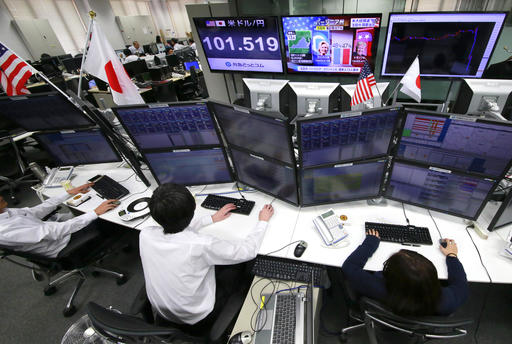
Money traders watch computer screens with the day’s exchange rate between yen and the U.S. dollar at a foreign exchange brokerage in Tokyo, Wednesday, Nov. 9, 2016. Asian shares have shed early gains, tumbling Wednesday as Donald Trump gained the lead in the electoral vote count in the presidential election. Dow and S&P futures also plunged. Earlier, investors had appeared persuaded that Hillary Clinton, seen as a more stable choice, would prevail. AP Photo/Shizuo Kambayashi
LONDON – Conciliatory comments from U.S. President-elect Donald Trump in the aftermath of his stunning victory over Hillary Clinton helped global stock markets erase a large chunk of their earlier losses Wednesday.
Though uncertainty remains over Trump’s trade, immigration and geopolitical policies, investors appeared somewhat soothed by his victory speech, in which he praised Clinton and urged Americans to “come together as one united people” after a deeply divisive campaign.
In Europe, Germany’s DAX was down 0.7 percent at 10,408 while the FTSE 100 index of leading British shares was 0.1 percent lower at 6,838. U.S. stocks are expected to open lower, too, though by far less than earlier predicted. Dow futures are 1.7 percent lower at 17,974 while the broader S&P 500 futures were down 1.8 percent at 2,097.
“That the reaction seen thus far appears to have been much more tempered is probably due to the emollient and conciliatory nature of Trump’s acceptance speech, and the fact that there was always that nagging doubt that the pollsters may well be wrong,” said Michael Hewson, chief markets analyst at CMC Markets.
As Trump gained the lead in the electoral vote count, investors became increasingly uneasy and share prices tumbled in Asia, which were open during the election results. Dow futures were down 4 percent at one point. However, by the time Trump was confirmed the winner and made his speech, financial markets had steadied.
“There’s scope to applaud the fact that the opening bell will come with the certainty of who the next president will be, but given the lack of detail on an economic policy agenda, investors will unsurprisingly still be feeling wary,” said Remo Fritschi, Institutional Sales Manager at ADS Securities London.
The dollar also recouped some ground, while assets that many investors search out at times of uncertainty, such as gold and the Swiss franc, came off earlier highs. An ounce of gold was up 2.4 percent at $1,305 while the dollar was only 0.4 percent lower at 0.9734 Swiss franc.
One currency that remains heavily sold is the Mexican peso. It was down 8.5 percent as the prospect of a wall along the United States’ southern border â a key campaigning point for Trump â has come one step closer to reality. Trump has insisted that Mexico will pay for the wall. Also potentially impacting the peso is Trump’s threat to rip up trade deals like the North American Free Trade Agreement, a key plank in Mexico’s economic strategy and growth.
“If Trump is able to follow through with these suggestions, Mexican activity will suffer greatly,” said Jane Foley, senior foreign exchange strategist at Rabobank International.
Under the U.S. constitution, Trump doesn’t formally take the reins of power until January but he will begin the transition to his presidency almost immediately. In the coming weeks, investors will be looking to see if he further tempers some of the rhetoric that polarized American opinion and often spooked investors in financial markets.
Trump’s victory could make the U.S. Federal Reserve less likely to raise its key interest rate at its next meeting in mid-December â especially if financial markets remain under pressure. Some analysts are ruling it out entirely.
“Less chance of a Fed rate hike also helps keep investors smiling at the prospect of cheap money and accommodative global monetary policy stance for a while longer,” said Mike van Dulken, an analyst at Accendo Markets.
Another point of interest will center on the U.S.’s trade relations with China and its impact across Asia. Trump’s victory has raised concerns that the U.S. and China might embark on a trade war of sorts and that protectionism around the world will grow. In Asia, Japan’s Nikkei 225 stock index closed 5.4 percent lower, recouping some losses, at 16,251.54. Hong Kong’s Hang Seng closed 2.2 percent lower to 22,415.19 while the main index in Shanghai fell 0.6 percent to 3,128.77.
“Investors will right now be in the process of attempting to differentiate between Trump’s actual policy positions and some of the more outlandish statements made on the campaign trail,” said Michael Levy, an emerging markets investment director at Barings.
South Korea’s trade ministry held an emergency meeting to review prospects of U.S. trade policies after the presidential elections. Top officials from Japan’s central bank and finance ministry met Wednesday to discuss how to cope with the gyrations in financial markets. Japan’s Deputy Finance Minister Masatsugu Asakawa said speculative movements were at work in the currency markets. “We will take necessary steps if speculative actions continue,” Asakawa said.